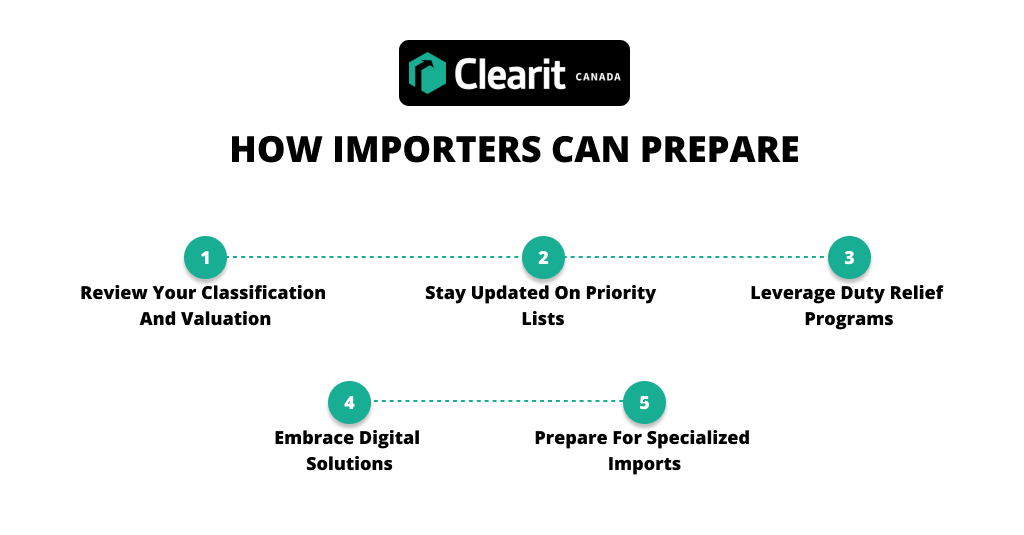For Canadian importers, few things are as crucial as staying on top of compliance with the Canada Border Services Agency (CBSA). One of the most significant tools the CBSA uses to enforce trade compliance is the Trade Verification Priorities List, a roadmap of the product categories and customs issues the agency will be paying extra attention to.
In 2025, importers need to understand how the list works, its impact on operations, and how to prepare for audits or verifications. Let’s break it down.
What Is the CBSA Trade Verification Priorities List?
Every year, the CBSA releases a list of goods and compliance areas that are under review. This can include specific product categories, tariff classifications, valuation practices, and origin claims.
The purpose of these verifications is twofold:
- To ensure importers are paying the correct duties and taxes.
- To make sure Canadian businesses are competing on a level playing field with foreign suppliers.
If your product falls under one of the categories on the list, your shipments could be subject to closer inspection, documentation requests, or even a formal audit.
Why It Matters for Importers in 2025
With global trade shifting rapidly, think carbon pricing measures, supply chain realignments, and the growth of digital customs, the CBSA is expected to refine its verification strategy in 2025. Importers need to be prepared for tighter enforcement and less tolerance for errors.
For example, the introduction of carbon border adjustment mechanisms in Canada could put additional focus on industries with higher carbon footprints. Importers in these sectors can expect heightened scrutiny of declared values and compliance.
Common Areas of Verification
Some categories frequently appear on the CBSA’s radar:
- Tariff Classification: Ensuring that goods are properly classified under the Harmonized System (HS). Even small misclassifications can lead to costly duty assessments.
- Valuation: Determining the correct value for duty—this includes the transaction price, discounts, assists, and other adjustments.
- Origin: Confirming whether goods qualify for preferential tariff treatment under free trade agreements.
Importers dealing in regulated categories such as pet products or beauty products requiring Health Canada compliance should be especially cautious, as these often attract attention due to health and safety regulations.

How Importers Can Prepare
Here are steps Canadian businesses can take to stay ahead of CBSA trade verifications:
- Review Your Classification and Valuation
Double-check tariff codes and ensure your valuation methodology aligns with CBSA guidelines. - Stay Updated on Priority Lists
If your product falls into categories such as top imported product categories in Canada, expect extra attention. - Leverage Duty Relief Programs
Programs like the duty remission and relief options for Canadian importers can help offset potential costs. - Embrace Digital Solutions
Canada is moving toward digital customs processes, meaning errors will be easier for CBSA to detect. Automating documentation and compliance checks can reduce risk. - Prepare for Specialized Imports
Niche importers, whether bringing in e-bike kits or obtaining an importer number tied to their business number, need to ensure they’re fully compliant with CBSA requirements.
Looking Ahead: 2025–26
Trade enforcement is only expected to tighten in the coming years. As Canada strengthens its climate commitments, integrates more digital tools, and ensures competitiveness in global markets, the CBSA’s verification list will continue to evolve.
Importers who proactively review their practices, keep updated with compliance trends, and take advantage of relief programs will be best positioned to avoid disruptions and penalties.
Final Thoughts
The CBSA Trade Verification Priorities List is not just a formality, it’s a direct signal of where the agency is focusing its enforcement energy. Importers should view it as both a warning and an opportunity: a warning to tighten compliance, and an opportunity to differentiate themselves as trustworthy and reliable trade partners.
Proactive compliance ensures you won’t be caught off guard by CBSA verification. Clearit’s team of experts can help you stay ahead of compliance requirements and protect your business from costly disruptions.
Start with Clearit Canada Platform today to safeguard your imports in 2025 and beyond

 Payment
Payment  My Account
My Account